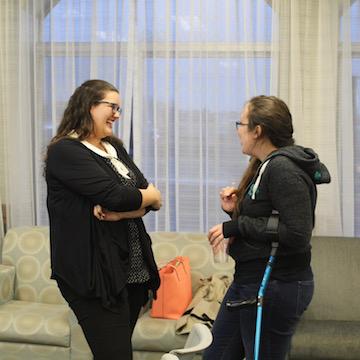Medieval Studies Career Placement

Madelyn Burt (MVST '14) and Rebecca Weiss-Horowitz
(MA Program, Medieval Studies) discuss life after graduation
after the Compatible Careers panel discussion (April 2016).
Medieval Studies alumni pursue a variety of careers, both within academia and without. Some recent placements include:
- Michael Innocenti (M.A. 2020) is teaching philosophy and literature at the Montfort Academy for the 2020-2021 academic year.
- Ashley Newby (M.A. 2019) is an assistant to the manager of eleoteca and specialty herb nursery at a vineyard and olive grove in the Dundee Hills of Oregon. She also works for a local Oregon-based dealer of rare books.
- Christie Olek (M.A. 2019) is enrolled in the Ph.D. program in History at Fordham University.
- Galina Krasskova (M.A. 2019) is enrolled in the Ph.D. program in Theology at Fordham University.
- Stephen G. Powell (M.A. 2018) is enrolled in the Ph.D. program in History at Rutgers University.
- Katherine Briant (M.A. 2017) is enrolled in the Ph.D. program in English at Rochester University.
- David Smigen-Rothkopf (M.A. 2017) is enrolled in the Ph.D. program in English at Fordham University.
- Kasey Fausak (M.A. 2017) is enrolled in the Ph.D. program in History at Fordham University.
- Alexander Profaci (M.A. 2016) is enrolled in the Ph.D. program in History at Johns Hopkins University.
- Alexa Amore (M.A. 2016) is enrolled in the Ph.D. program in Art History at New York University.
- Heather Hill (M.A. 2016) enrolled in the M.S. program in Library and Information Science at the Pratt Institute, where she was the chair of Pratt ASIS&T. She is currently an Instructional Technologist at Fordham University and a Ph.D. student in medieval history at Fordham University.
- Abigail Sargent (M.A. 2015) is enrolled in the Ph.D. program in History at Princeton University.
- Tobias Hrynick (M.A. 2015) is enrolled the Ph.D. program in History at Fordham University.
- Joseph Rudolph (M.A. 2015) is enrolled in the Ph.D. program in English at Fordham University.
- Sarah O'Brien (M.A. 2014) is enrolled in the Ph.D. program in English at Fordham University.
- Kristen Mapes (M.A. 2014) is a Digital Humanities Specialist at Michigan State University.
- Alison McCormack (M.A. 2014) is a Rare Book Catalog Librarian at Baylor University.
- Louisa Foroughi (M.A. 2013) is enrolled in the Ph.D. program in History at Fordham University. She defended her thesis in May 2020 and is now an Assistant Professor of History at Lafayette College.
- Brian Glasenapp, O.S.B. (M.A. 2013) is enrolled in the Ph.D. program in Music at Columbia University.
- Kiley Samz (M.A. 2013) is an antiquarian bookseller at Bruce McKittrick Rare Books in Narberth, Pennsylvania.
- Sarah Townsend (M.A. 2012) is in the Ph.D. program in English at the University of Pennsylvania.
- Scott Miller (M.A. 2012) is in the Ph.D. program in Art History at Northwestern University.
- Christopher Rose (M.A. 2012) is in the Ph.D. program in History at Fordham University.
We recently tracked 100 of our MA graduates in Medieval Studies:
*45% of the MA graduates went on to PhD work, a much higher percentage than for most MA programs. About half went into doctoral programs at Fordham, but others went to such universities as Berkeley, Cambridge (UK), Columbia, CUNY, Kentucky, Michigan, Northwestern, Notre Dame, Ohio State, Pennsylvania, Tennessee-Knoxville, Texas-Austin, Toronto, and Yale, and the University of New Mexico, among others.
*17% of the MA graduates pursued other post-graduate degrees in another field, such as Business, Divinity, Education, Law, and, especially Library Science.
In 2014, these 100 graduates were pursuing these career options:
- 22% were still in Ph.D. programs
- 15% were in some sort of business field (half of these were in IT)
- 14% were high-school teachers (including two administrators)
- 13% had their Ph.D.s and were teaching or working in university administration
- 12% were writers, rare book dealers, or in publishing
- 10% had their Ph.D.s and were teaching at the college level
- 9% were working librarians
- 6% were in legal careers
- 5% were in non-profit administration
- 4% were artists or in arts/museum administration
To help our student medievalists understand the options open to them, the Center runs a Compatible Careers Workshop each April, when we bring back alumni to discuss how the skills they acquired as medievalist graduate students can be transferred to non-academic careers.